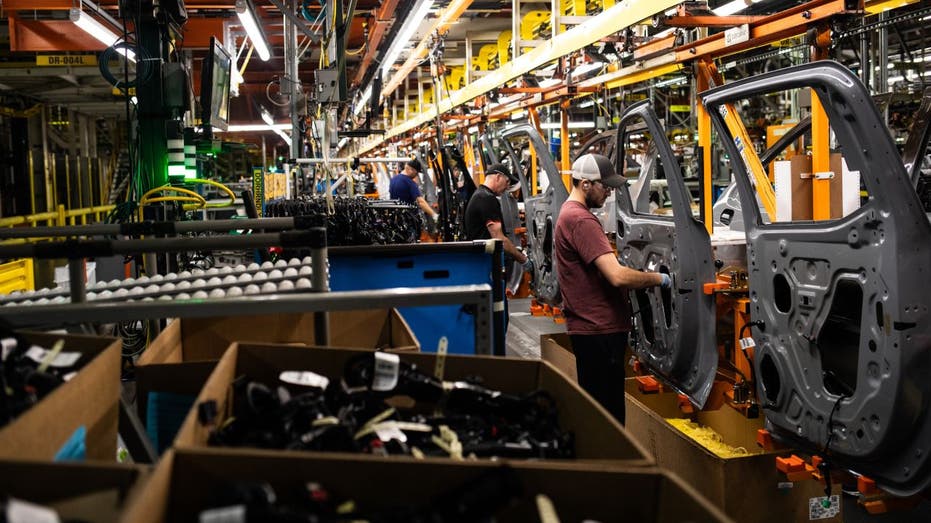Would a 4-day work week work in the US?
Working fewer hours for the same pay sounds great to employees, but skeptics say widespread adoption of a 4-day work week could not fly in America
4-day workweek proved to be transformative and life change: Joe OConnor
Work Time Reduction Center of Excellence co-founder Joe OConnor discusses the results of a U.K. study that measured the success of a 4-day workweek on Varney & Co.
The prospect of slashing a day of work from the schedule each week without a lower paycheck is a great deal for workers, so it is not surprising that multiple studies show employees love the idea of a 4-day work week – especially in this age of high burnout.
While some experts say the shorter work week might be a great solution for some industries, skeptics say its broad adoption would never work in America.

The movement for a 4-day work week has received a lot of good press, but some experts are skeptical of whether widespread adoption would ever work in the U.S. (iStock / Getty Images)
"There is truth to the idea of working ‘smarter, not harder,’ and research supports that well-rested, motivated employees tend to be more productive and creative," said Sunny Bonnell, CEO of branding agency Motto. Bonnell argues that a 4-day workweek can encourage people to "prioritize high-value tasks, minimize distractions, and focus on outcomes rather than hours worked."
Bonnell says companies with forward-thinking, people-focused cultures such as in tech or creative industries could likely lead the way by integrating shorter workweeks to enhance morale and prevent burnout, and says such companies could see higher retention rates and increased productivity as employees operate in a culture that values balance and innovation over pure hours.
PEOPLE GOING TO WORK WAS A ‘GREAT THING,’ FOOD INDUSTRY EXPERT BUTCH YAMALI SAYS
The branding expert said a shorter work week could also positively impact the environment by reducing commuting days.

Workers assemble vehicle doors at the General Motors assembly plant in Fort Wayne, Indiana, US, on Tuesday, April 9, 2024. Proponents of a 4-day work week say it would ease worker burnout, while skeptics argue it would kill production in some industr (Photographer: Emily Elconin/Bloomberg via Getty Images / Getty Images)
Julia Hobsbawm, a workplace futurist and author who predicted hybrid work years before the pandemic, said the movement for a system that would mean a 20% reduction in working hours for 100% pay "is commendable, but I don't think it will work."
Hobsbawm said the labor market today simply cannot be compared precisely to Henry Ford's 40-hour-week workforce, pointing out that new technology is pervasive, leading some workers to bring their work home thanks to the advent of email and smart devices, so their working hours aren't confined to the factory floor.
TRADE BUSINESSES ARE CHANGING THE NARRATIVE ON WHAT IT MEANS TO BE A MILLIONAIRE
Many companies experimenting with the 4-day week structure their systems not on a strict 4-day schedule, Hobsbawm noted, but instead on building flexible arrangements that suit individual workers' and companies' needs. For example, some workers may be able to opt to work two half-days instead of taking one day off.

A worker arranges produce at a Costco store in Teterboro, New Jersey, US, on Wednesday, Feb. 28, 2024. (Photographer: Stephanie Keith/Bloomberg via Getty Images / Getty Images)
"I think the 4-day work week movement will join the likes of campaigns for universal basic income and remain a bit of a niche, but can still influence businesses as a whole," Hobsbawm said.
Preston Taylor, head of people and culture at Human Capital Management (HCM) startup Helios, says he does believe there are positives to the 4-day work week, but also "believes it would struggle to be successful in a much larger economy and work-obsessed culture like we have in the US."
MORE AMERICANS LIVING PAYCHECK TO PAYCHECK THAN 5 YEARS AGO, BANK OF AMERICA DATA SHOWS
Taylor said it could be successful in certain industries in the US like tech, government and finance, but would definitely create major disruptions and increased costs for other industries like healthcare, retail, manufacturing, and some other service-based companies that are reliant on production schedules, significant customer service needs, and organizations that need to operate 24/7.
Cardone Capital CEO Grant Cardone told FOX Business, "Four-day work weeks would be a disaster for this country, that already has exported too many jobs to other countries with better work ethic."

Construction at the Toll Brothers Borello Ranch Estates housing community in Morgan Hill, California, US, on Tuesday, June 4, 2024. (Getty / Getty Images)
The private equity fund manager and real estate investor argued that the housing industry, for example, cannot operate on a 4-day work week, and asked rhetorically how the nation would be able to keep up with what is already a shortage of homes if the U.S. were to impose such a system.
GET FOX BUSINESS ON THE GO BY CLICKING HERE
Cardone also says a shorter work week would only accelerate robot technology and artificial intelligence (AI) replacing humans in the workplace.
"Be careful what you ask for folks - one day you won’t have anything to do," he added. "Work is the greatest gift given to us. The more I work, the happier I am."





















